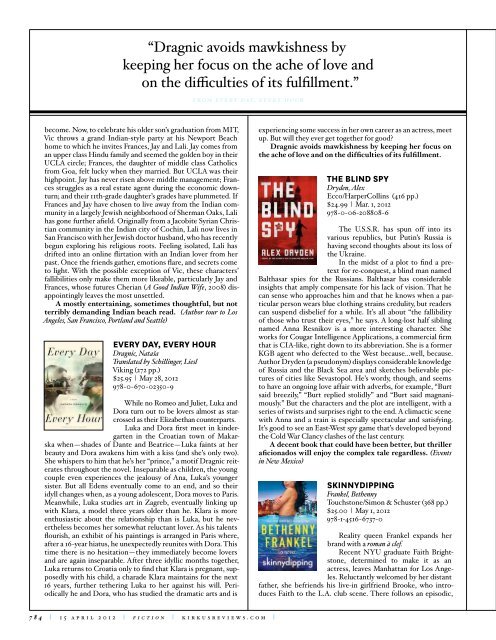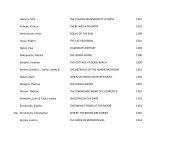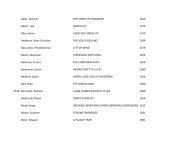nonfiction
nonfiction
nonfiction
Create successful ePaper yourself
Turn your PDF publications into a flip-book with our unique Google optimized e-Paper software.
“Dragnic avoids mawkishness by<br />
keeping her focus on the ache of love and<br />
on the difficulties of its fulfillment.”<br />
from every day, every hour<br />
become. Now, to celebrate his older son’s graduation from MIT,<br />
Vic throws a grand Indian-style party at his Newport Beach<br />
home to which he invites Frances, Jay and Lali. Jay comes from<br />
an upper class Hindu family and seemed the golden boy in their<br />
UCLA circle; Frances, the daughter of middle class Catholics<br />
from Goa, felt lucky when they married. But UCLA was their<br />
highpoint. Jay has never risen above middle management; Frances<br />
struggles as a real estate agent during the economic downturn;<br />
and their 11th-grade daughter’s grades have plummeted. If<br />
Frances and Jay have chosen to live away from the Indian community<br />
in a largely Jewish neighborhood of Sherman Oaks, Lali<br />
has gone further afield. Originally from a Jacobite Syrian Christian<br />
community in the Indian city of Cochin, Lali now lives in<br />
San Francisco with her Jewish doctor husband, who has recently<br />
begun exploring his religious roots. Feeling isolated, Lali has<br />
drifted into an online flirtation with an Indian lover from her<br />
past. Once the friends gather, emotions flare, and secrets come<br />
to light. With the possible exception of Vic, these characters’<br />
fallibilities only make them more likeable, particularly Jay and<br />
Frances, whose futures Cherian (A Good Indian Wife, 2008) disappointingly<br />
leaves the most unsettled.<br />
A mostly entertaining, sometimes thoughtful, but not<br />
terribly demanding Indian beach read. (Author tour to Los<br />
Angeles, San Francisco, Portland and Seattle)<br />
EVERY DAY, EVERY HOUR<br />
Dragnic, Nataša<br />
Translated by Schillinger, Liesl<br />
Viking (272 pp.)<br />
$25.95 | May 28, 2012<br />
978-0-670-02350-9<br />
While no Romeo and Juliet, Luka and<br />
Dora turn out to be lovers almost as starcrossed<br />
as their Elizabethan counterparts.<br />
Luka and Dora first meet in kindergarten<br />
in the Croatian town of Makarska<br />
when—shades of Dante and Beatrice—Luka faints at her<br />
beauty and Dora awakens him with a kiss (and she’s only two).<br />
She whispers to him that he’s her “prince,” a motif Dragnic reiterates<br />
throughout the novel. Inseparable as children, the young<br />
couple even experiences the jealousy of Ana, Luka’s younger<br />
sister. But all Edens eventually come to an end, and so their<br />
idyll changes when, as a young adolescent, Dora moves to Paris.<br />
Meanwhile, Luka studies art in Zagreb, eventually linking up<br />
with Klara, a model three years older than he. Klara is more<br />
enthusiastic about the relationship than is Luka, but he nevertheless<br />
becomes her somewhat reluctant lover. As his talents<br />
flourish, an exhibit of his paintings is arranged in Paris where,<br />
after a 16-year hiatus, he unexpectedly reunites with Dora. This<br />
time there is no hesitation—they immediately become lovers<br />
and are again inseparable. After three idyllic months together,<br />
Luka returns to Croatia only to find that Klara is pregnant, supposedly<br />
with his child, a charade Klara maintains for the next<br />
16 years, further tethering Luka to her against his will. Periodically<br />
he and Dora, who has studied the dramatic arts and is<br />
experiencing some success in her own career as an actress, meet<br />
up. But will they ever get together for good<br />
Dragnic avoids mawkishness by keeping her focus on<br />
the ache of love and on the difficulties of its fulfillment.<br />
THE BLIND SPY<br />
Dryden, Alex<br />
Ecco/HarperCollins (416 pp.)<br />
$24.99 | Mar. 1, 2012<br />
978-0-06-208808-6<br />
The U.S.S.R. has spun off into its<br />
various republics, but Putin’s Russia is<br />
having second thoughts about its loss of<br />
the Ukraine.<br />
In the midst of a plot to find a pretext<br />
for re-conquest, a blind man named<br />
Balthasar spies for the Russians. Balthasar has considerable<br />
insights that amply compensate for his lack of vision. That he<br />
can sense who approaches him and that he knows when a particular<br />
person wears blue clothing strains credulity, but readers<br />
can suspend disbelief for a while. It’s all about “the fallibility<br />
of those who trust their eyes,” he says. A long-lost half sibling<br />
named Anna Resnikov is a more interesting character. She<br />
works for Cougar Intelligence Applications, a commercial firm<br />
that is CIA-like, right down to its abbreviation. She is a former<br />
KGB agent who defected to the West because...well, because.<br />
Author Dryden (a pseudonym) displays considerable knowledge<br />
of Russia and the Black Sea area and sketches believable pictures<br />
of cities like Sevastopol. He’s wordy, though, and seems<br />
to have an ongoing love affair with adverbs, for example, “Burt<br />
said breezily,” “Burt replied stolidly” and “Burt said magnanimously.”<br />
But the characters and the plot are intelligent, with a<br />
series of twists and surprises right to the end. A climactic scene<br />
with Anna and a train is especially spectacular and satisfying.<br />
It’s good to see an East-West spy game that’s developed beyond<br />
the Cold War Clancy clashes of the last century.<br />
A decent book that could have been better, but thriller<br />
aficionados will enjoy the complex tale regardless. (Events<br />
in New Mexico)<br />
SKINNYDIPPING<br />
Frankel, Bethenny<br />
Touchstone/Simon & Schuster (368 pp.)<br />
$25.00 | May 1, 2012<br />
978-1-4516-6737-0<br />
Reality queen Frankel expands her<br />
brand with a roman à clef.<br />
Recent NYU graduate Faith Brightstone,<br />
determined to make it as an<br />
actress, leaves Manhattan for Los Angeles.<br />
Reluctantly welcomed by her distant<br />
father, she befriends his live-in girlfriend Brooke, who introduces<br />
Faith to the L.A. club scene. There follows an episodic,<br />
summary-heavy narration of Faith’s encounters with men, old<br />
and young, most of whom do nothing to advance her career or<br />
enliven her love life. The exception is Vince Beck, a sexy producer<br />
with an Aussie accent, but, unsurprisingly, he turns out to<br />
be married. After two stints as personal assistant to the petty<br />
tyrants that are so much a staple of Hollywood literature (in a<br />
perhaps subliminal nod to Sunset Boulevard, one of Faith’s jobs<br />
ends when a scriptwriter is found dead in her employer’s pool),<br />
Faith cannot get a part—her weight, normal everywhere else, is<br />
chubbette-grade in California. Embarking, with her cheerfully<br />
bulimic roommate, on a starvation diet, she gets skinny then<br />
finally gets cast—in a soft porn flick. So much for Hollywood<br />
dreams. Part two finds Faith back in Manhattan five years later.<br />
She’s turned her obsession with weight into a promising small<br />
business. Her over-the-top repartee and entrepreneurial chops<br />
garner the attention of the producers of Domestic Goddess, a<br />
cable reality TV show hosted by Sybil Matthews, a fictional avatar<br />
of Martha Stewart, only more diabolical. The remainder of<br />
the book chronicles the usual reality show indignities as contestants<br />
are ritually humiliated and eliminated, challenge by challenge.<br />
Sybil already has Faith in her sights, since Faith has some<br />
dirt on a fellow contestant and a history with the show’s executive<br />
producer. What will the home and garden diva do when she<br />
finds out her own son is Faith’s latest club conquest<br />
Although the writing is competent, this novel illustrates<br />
the main difficulty posed by “reality-based” fiction:<br />
the inherent tedium of unedited real life, however glitzy<br />
the surroundings.<br />
BLUE MONDAY<br />
French, Nicci<br />
Pamela Dorman/<br />
Viking (400 pp.)<br />
$26.95 | Mar. 1, 2012<br />
978-0-670-02336-3<br />
More than 20 years after the unsolved<br />
disappearance of a five-year-old London<br />
girl, a little boy, also five, is abducted, reopening<br />
old wounds for a police detective<br />
and raising questions for a female psychiatrist—especially<br />
after it is revealed that the prime suspect, a client<br />
of hers, has an identical twin brother of whom he is unaware.<br />
This is the first installment in a series of psychological thrillers<br />
by French, pen name for the bestselling husband and wife duo<br />
of Nicci Gerrard and Sean French (Land of the Living, 2003, etc.).<br />
The appealing, strong-willed protagonist is Freida Klein, a single<br />
woman in her 40s whose most intimate relationship is with the<br />
shadowy city—notwithstanding a romantic fling that tempts her<br />
for a few seconds to leave London. She has more than enough to<br />
distract her from her private life. Her new patient, Alan, is a miserable<br />
soul who is so desperate for a son he dreams of making off<br />
with a boy who is the spitting image of the missing tyke. Detective<br />
Chief Inspector Karlsson is leery of Freida’s concerns, and<br />
resists new tests, but he slowly comes to value Freida’s theories.<br />
Though a small leap of faith is required in the end, the surprises<br />
and suspense never let up. The book provides fascinating psychological<br />
insight. And the supporting characters, ranging from<br />
a droll Polish laborer to Freida’s disheveled mentor, are warm,<br />
intelligent and provide just the right amount of humor. Off-thebeaten-path<br />
London is also a great character.<br />
An absorbing psychological thriller that will leave you<br />
anticipating the next installment. (Agents: Sarah Ballard and<br />
Simon Trewin)<br />
THE NEWLYWEDS<br />
Freudenberger, Nell<br />
Knopf (352 pp.)<br />
$25.95 | May 1, 2012<br />
978-0-307-26884-6<br />
Freudenberger (The Dissident, 2006,<br />
etc.) examines a marriage arranged via<br />
the Internet.<br />
They met on AsianEuro.com: Amina<br />
wanted to escape from her family’s straitened<br />
circumstances in Bangladesh; George wanted someone who<br />
“did not play games, unlike some women he knew.” So here she<br />
is, in the fall of 2005 in the suburbs of Rochester, N.Y., recently<br />
married, working in retail while she studies for a teaching certificate.<br />
Her husband seems nice, if a little fussy, but he hasn’t said<br />
any more about converting to Islam as she promised her parents,<br />
and they haven’t had a Muslim wedding yet either. More disconcerting<br />
than any of that, though, is Amina’s sense that “she was<br />
a different person in Bangla than she was in English,” and she’s<br />
uncertain how to bridge the gulf between these two selves. She<br />
makes a much-needed friend in George’s cousin Kim, who lived<br />
for a while in Bombay and was briefly married to an Indian. Kim<br />
understands more about Amina’s background and her conflicts<br />
than anyone else in Rochester, so when it turns out that she and<br />
George have been hiding something important from Amina, it’s<br />
doubly shattering. However, it does prompt George to agree to<br />
bring Amina’s parents to America, and she goes to collect them<br />
in Bangladesh, where several old family conflicts flare anew.<br />
Freudenberger does well in capturing the off-kilter feelings of a<br />
young woman in a country so unlike her birthplace, and the cultural<br />
differences prompt some enjoyably wry humor. The characters<br />
are all well drawn, if a trifle pallid, which points to a larger<br />
problem. Freudenberger’s tone is detached and cool throughout,<br />
even when violent incidents are described, which makes it difficult<br />
to emotionally engage with the story. The novel is carefully<br />
researched rather than emotionally persuasive.<br />
Well executed but a bit too obviously studied—more<br />
willed than felt. (Author tour to Boston and New England, Los<br />
Angeles, New York, San Francisco and Seattle)<br />
784 | 15 april 2012 | fiction | kirkusreviews.com |<br />
| kirkusreviews.com | fiction | 15 april 2012 | 785






